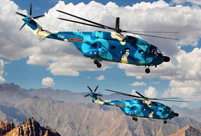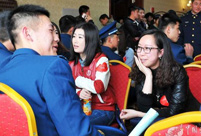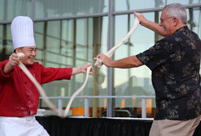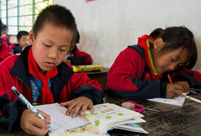 'Model husband' shatters image of love
'Model husband' shatters image of love
 Can animals smile? Or put on a happy face
Can animals smile? Or put on a happy face
 Geng Xuan crowned at 9th China Super Model Contest
Geng Xuan crowned at 9th China Super Model Contest
 Top 10 billionaires in the liquor industry
Top 10 billionaires in the liquor industry
 Backstage at China Fashion Week
Backstage at China Fashion Week
 Ballerinas anywhere but onstage
Ballerinas anywhere but onstage
 Top 10 safest airlines in the world
Top 10 safest airlines in the world
 Posters of 33rd HK Film Awards unveiled
Posters of 33rd HK Film Awards unveiled
 Top 10 most popular instant messaging apps in the world
Top 10 most popular instant messaging apps in the world
 Inspiring shadow images of Chinese army
Inspiring shadow images of Chinese army
Since the Ukraine crisis, and especially after Crimea joined Russia, the American media have made widespread use of the phrase "New Cold War" to describe the tense relationship between the United States and Russia. In contrast, the author argues that the western world and Russia will not head into a new round of cold war, but to a period of cold peace which will exert significant influence on international trends.
Firstly, the basic elements for cold war no longer exist. Essential changes have transformed US and Russian power. Russia can no longer match the US, whether in military power, economic development, or comprehensive soft power. Moreover, the two sides no longer operate opposing blocs. The Warsaw Treaty Organization and the Council of Mutual Economic Assistance that used to confront the North Atlantic Organization and the European Communities collapsed along with the Soviet Union. Most importantly, in a world of economic globalization, economic war will hurt all parties.
The recent military exercises and counter-response exercise, and the sanction and counter-sanction maneuvers between the western world and Russia appear to indicate cold war. In truth these actions are largely symbolic, and cannot be compared with events during the Berlin Crisis or the Cuba Missile Crisis.
The western world and Russia will head to a period of cold peace rather than a period of cold war. The western world will adjust its policy towards Russia. While maintaining necessary cooperation on issues such as Syria, the DPRK, anti-terrorism, and nuclear non-proliferation, the two sides will be more confrontational.
In politics, the western world cancelled the EU/Russia summit and expelled Russia from the G8.
Concerning military affairs, confrontations between the western world and Russia are intensifying. NATO has suspended its cooperation with Russia. It will establish permanent military bases in Baltic countries to relieve unease among Eastern European countries. NATO will strengthen its cooperation with Ukraine. The US is planning to expand military cooperation with Poland and the Baltic countries. It will add 600 soldiers in Romania.
Regarding energy, the Ukraine crisis is pushing European countries to explore more diverse energy sources to reduce its reliance on Russian supplies.
As mentioned above, the western world and Russia will head into a period of "cold peace". To isolate Russia, the US will refocus on the European continent. In response, Russia will seek support from Asia. Significant changes will be apparent in terms of international geopolitics.
The article is edited and translated from美俄陷入“冷和平”
, source: Jiefang Daily; Author:Wu Zhenglong
 Wonderful moment of China's airborne forces
Wonderful moment of China's airborne forces Bai Baihe shoots for fashion magazine
Bai Baihe shoots for fashion magazine Red terraced fields in Dongchuan of Yunnan
Red terraced fields in Dongchuan of Yunnan Jiaju Tibetan Village
Jiaju Tibetan Village Spring dating
Spring dating Confucius institute at UC Davis
Confucius institute at UC Davis Little painted faces at temple fair
Little painted faces at temple fair Top 10 safest airlines in the world
Top 10 safest airlines in the world Foreign students at China-Myanmar border
Foreign students at China-Myanmar border The backstage of the Fashion Week
The backstage of the Fashion Week College students in Han costumes
College students in Han costumes Postgraduate works as waitress
Postgraduate works as waitress Life in a Lahu village in Yunnan
Life in a Lahu village in Yunnan An orphan’s wedding
An orphan’s wedding Hollywood documentary brings Diaoyu Islands truth to new audience
Hollywood documentary brings Diaoyu Islands truth to new audienceDay|Week|Month